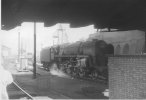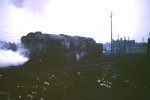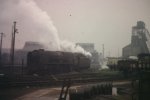I’m interested in the decline of steam in the UK in the 1960s, and was watching some old film of the last couple of years - the level of neglect is clear, locos were absolutely filthy, nameplates removed etc. This is in contrast with the early 1960s when it seems a degree of pride in locos was still apparent, particularly express engines. I was just wondering was there a particular date that BR decided loco cleaning was to end? Were loco cleaners made redundant at some point or moved onto other duties? Or was it a gradual decline throughout the decade? Thanks in advance if anyone has any info.
-
Our booking engine at tickets.railforums.co.uk (powered by TrainSplit) helps support the running of the forum with every ticket purchase! Find out more and ask any questions/give us feedback in this thread!
You are using an out of date browser. It may not display this or other websites correctly.
You should upgrade or use an alternative browser.
You should upgrade or use an alternative browser.
When did routine cleaning of steam locos end?
- Thread starter 12C
- Start date
- Status
- Not open for further replies.
Sponsor Post - registered members do not see these adverts; click here to register, or click here to log in
R
RailUK Forums
Flying Phil
Established Member
- Joined
- 18 Apr 2016
- Messages
- 1,943
I think it was a gradual decline and depended upon the individual sheds. Certainly the Leicester locos were very grubby in the early 60's. Nine Elms locomotives were usually grubby in the last years but Salisbury shed seemed to be good for cleaning right up to the end of SR Steam.
Here are some of my pictures to illustrate.




Here are some of my pictures to illustrate.




Last edited:
Loppylugs
Member
I joined the railway in the early sixties and was based at Reading (81D) depot. In the sixties, with steam haulage coming to an end, many locomen left the industry for other jobs. In previous years employees would spend several years as cleaners before graduating to firing duties and onwards to drivers, but with men leaving the railway in droves, cleaning of locos became minimal. We had an old-timer who was in charge of the cleaning gang, even though there were only four of us, but within three months we had all graduated to firing duties. I kept a list of all the engines I cleaned (and fired) and still have it to this day. We had a few express locos at Reading, although it was mainly a freight shed, but by the sixties many big engines had been relegated to freight duties. There were always two engines at the station on pilot duties in case of failures and these were always kept in good nick, normally a "Castle" class or "Modified Hall" on down line stand-by and usually a "Manor" class on up-line. I would regularly give the loco a polish up while we were awaiting work in the station area.
14C to 83B
New Member
- Joined
- 11 Aug 2019
- Messages
- 4
It was not a case of any cut of date the main reason was that the railways could not attract enough staff although some sheds most notably Gateshead even in the 50's had a reportation of never cleaning its engnies.
It really started in WW2, when there was a shortage of cleaners and other basic loco grades. Working on the railway was a "reserved occupation", from which employees could not be taken by conscription for the military, but that did not impact personnel applying, or not, for railway jobs in the first place. Conscription started at 18, and as recruitment for the loco department had always started at 18, this meant virtually nobody was applying. If they weren't fit for the army they generally weren't fit for "the loco". There were such shortages that even firemen were an issue, and there were some light steam shunting turns operated with just one man in the cab.
Taunton shed were supplied with a couple of Italian prisoners-of-war for basic duties, but this was almost wholly ash shovelling and other such tasks. One of them didn't go home afterwards but carried on as an employee.
Taunton shed were supplied with a couple of Italian prisoners-of-war for basic duties, but this was almost wholly ash shovelling and other such tasks. One of them didn't go home afterwards but carried on as an employee.
I think the loco took people from age 16, if not 15.It really started in WW2, when there was a shortage of cleaners and other basic loco grades. Working on the railway was a "reserved occupation", from which employees could not be taken by conscription for the military, but that did not impact personnel applying, or not, for railway jobs in the first place. Conscription started at 18, and as recruitment for the loco department had always started at 18, this meant virtually nobody was applying. If they weren't fit for the army they generally weren't fit for "the loco". There were such shortages that even firemen were an issue, and there were some light steam shunting turns operated with just one man in the cab.
Taunton shed were supplied with a couple of Italian prisoners-of-war for basic duties, but this was almost wholly ash shovelling and other such tasks. One of them didn't go home afterwards but carried on as an employee.
Presumably once diesel & electric locos & multiple units were ordered in the late 50s recruitment of footplate staff would have ceased so there would have been very few cleaners, and priority would have been to cleaning the inner parts of locos.
The fifties seems a bit early to stop all recruitment of steam footplate staff - they were still building steam locos then! I don't know how recruitment was handled - was it essentially up to the depots to determine how much staff they needed?Presumably once diesel & electric locos & multiple units were ordered in the late 50s recruitment of footplate staff would have ceased so there would have been very few cleaners, and priority would have been to cleaning the inner parts of locos.
Clarence Yard
Established Member
- Joined
- 18 Dec 2014
- Messages
- 2,519
It would have been decided at District/Divisional level. Staff establishments would be set and the depots would recruit up to the budgeted level. They would also be planned reductions as depots closed or changed with the modernisation of the traction.
As sheds closed, staff retired or were made redundant and obviously you wouldn’t recruit loads of staff to make them redundant a short time later. Such was the pace of change that unless you might need them for a possible future on the footplate, you wouldn’t recruit them just to clean steam engines.
As sheds closed, staff retired or were made redundant and obviously you wouldn’t recruit loads of staff to make them redundant a short time later. Such was the pace of change that unless you might need them for a possible future on the footplate, you wouldn’t recruit them just to clean steam engines.
Gloster
Established Member
I do not know, but would expect that until the Beeching Report was in the offing, regional management would keep shedmasters informed of proposed changes and the shedmasters would adjust their recruitment to take into account any resultant reductions in staffing levels. However, Beeching threw a lamp iron in the works by leading to a greater than expected reduction in staff requirements due to closures and the shifting of diesels around so that they took over in some areas earlier than originally intended. It would be quite possible that a shedmaster would be careful not to recruit too many junior staff who might be made redundant, if indeed he was lucky enough to have a surfeit of applicants for a job that was seen by many as dying.
Head Office would fix the complement, with input from the depot management, but even if the shed was allowed 8 cleaners (or whatever figure) it didn't mean 8 could be recruited or retained.The fifties seems a bit early to stop all recruitment of steam footplate staff - they were still building steam locos then! I don't know how recruitment was handled - was it essentially up to the depots to determine how much staff they needed?
And easier in, say, Bangor than in, say, Saltley or Stewarts Lane.
- Status
- Not open for further replies.
